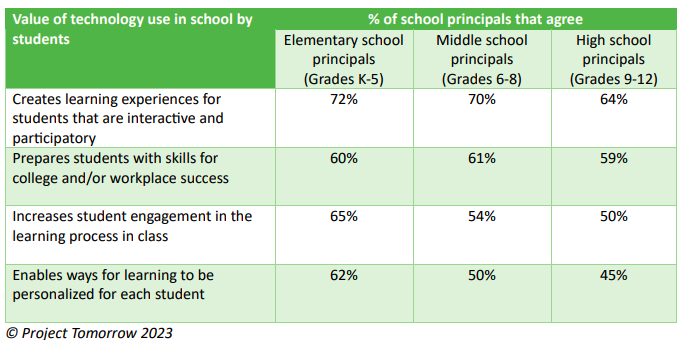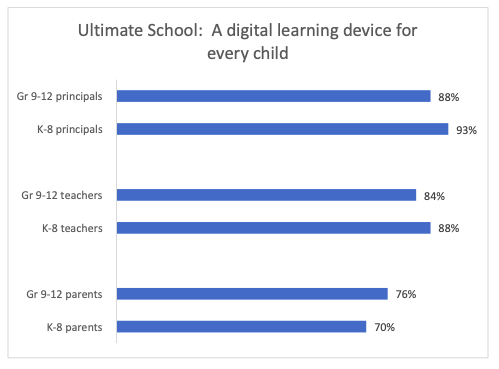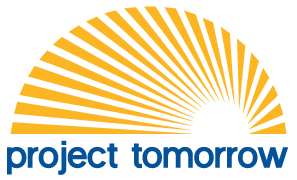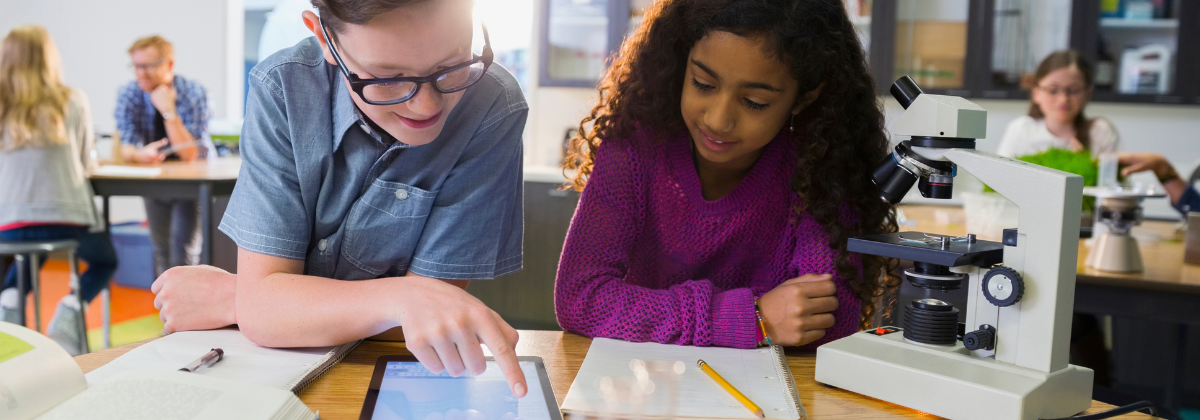Speak Up Research Brief: Value of technology use in school – views of parents, teachers and principals
Results from the 2021-22 Speak Up® Research Project
Parents of school-aged children, teachers and school principals express strong support for the value of
technology use within the learning process based upon the latest results from a nationwide poll
conducted by Project Tomorrow®, an education nonprofit organization with a 20-year history of
collecting and reporting on the authentic views of K-12 stakeholders about digital learning.
Per the national 2021-22 Speak Up Research Project, 91% of parents of school-aged children say that
when technology is used effectively and appropriately in school, it has a positive impact on their
child’s learning potential and success.

Parents place high importance on the use of technology within the classroom as a way for their child to
develop the critical information and media literacy skills needed for college, career and citizenry
readiness. Given the proliferation of social media within society, it is imperative that students learn
how to navigate online spaces safely and to acquire the skills to be effective in evaluating the credibility
of online content. The effective use of technology within the learning environments of the classroom
supports those goals. Over two-thirds of parents with children in K-12 schools prioritize the following
information and media literacy skills as most important for their child’s future success:
- Ability to evaluate the credibility of online resources and content they read or watch
- 77% of parents with children in grades K-5
- 79% of parents with children in grades 6-8
- 77% of parents with children in grades 9-12
- Ability to use technology and digital content responsibility as a good digital citizen
- 69% of parents with children in grades K-5
- 66% of parents with children in grades 6-8
- 62% of parents with children in grades 9-12
- Ability to know how to detect bias, censorship or propaganda in online resources including media
- 66% of parents with children in grades K-5
- 70% of parents with children in grades 6-8
- 71% of parents with children in grades 9-12
As instructional leaders within their school buildings, it is imperative that school principals and
administrators identify the right instructional materials that will result in enhanced student outcomes
and achievement. It is therefore noteworthy that in the Speak Up national sampling of school leaders,
principals connect the effective use of technology with students’ success in the classroom and their
preparation for the workforce. For example, 60% of school principals say technology use in the
classroom helps students develop the skills they need for success in college and/or in a future job or
career. This includes not only information literacy skills but critical thinking, problem-solving,
teamwork and communication skills.

Teachers’ views on the use of technology within their classrooms are in alignment with the views of
principals. In the Speak Up Research findings, teachers report on the many ways that the availability of
technology in their classroom today, including when students can use digital learning devices such as
tablets, laptops and Chromebooks, helps them to become a more effective teacher. Research has long
documented that increased teacher effectiveness is the number one predictor of improved student
outcomes. It is therefore noteworthy that nearly two-thirds of elementary and middle school teachers (64%) say that technology access in their classroom enables them to personalize instruction
to meet the individual needs of their students, providing remedial instruction when students need
more help, and allowing their students to accelerate their learning to leverage personal strengths.
Given the benefits articulated by parents, teachers and school principals about technology use in
classrooms today, it follows that these key K-12 stakeholders see the value of technology use by every
student as a key component of their vision for improving K-12 schools. When asked what types of
learning materials that would help students be most successful with their learning, the number one
approach identified by parents, teachers and school principals was to provide every student with a
Chromebook, laptop or tablet to use to support enhanced learning experiences in class. In total, 73%
of parents, 86% of teachers and 91% of principals say that providing a student with a digital learning
device will improve student outcomes.

About Project Tomorrow
Project Tomorrow’s nonprofit mission is to support the effective implementation of research-based learning experiences for students in K-12 schools. Project Tomorrow is particularly interested in the role of digital tools, content and resources in supporting students’ development of college and career ready skills. For the past 19 years, the organization has focused efforts on national research projects and the design and implementation of evaluation, efficacy and feedback studies examining the impact of digital tools or technology-enabled learning models in the classroom. Learn more about our research activities including our globally recognized Speak Up Research Project at www.tomorrow.org

